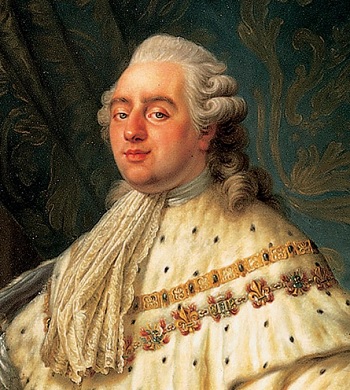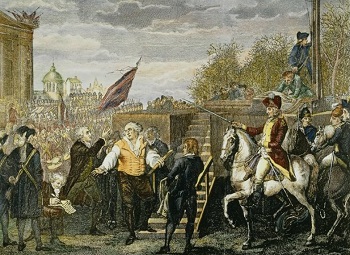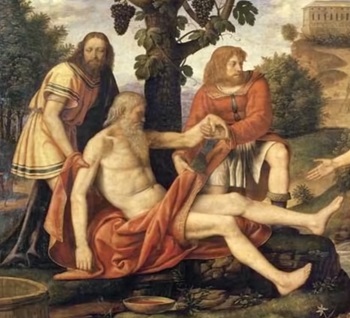Organic Society
 |
 |
 |
 |
 |
 |
 |
The People & the Masses
You may find a magnificent enumeration of the differences between an organic and an inorganic State in a text by Pius XII about what is a people and a mass. In the message he teaches that there are human societies formed in such way that all the power is concentrated in the supreme holder of the power of the State. In this society no one takes initiatives, no one has will, everyone is abulic, apathetic. (Radiomessage, December 24, 1944) (1)

 Abulia or apathy is a type of mental illness where the person lacks the will to do anything, cares about nothing – King Louis XVI belonged to this school. When the individual is abulic, the whole ensemble of his organism does not work well because the will does not drive the body. Sometimes this can even cause death. If we apply this to an omnipresent socialist State, we have an entire people who become apathetic; we have what Pius XII call “the masses.”
Abulia or apathy is a type of mental illness where the person lacks the will to do anything, cares about nothing – King Louis XVI belonged to this school. When the individual is abulic, the whole ensemble of his organism does not work well because the will does not drive the body. Sometimes this can even cause death. If we apply this to an omnipresent socialist State, we have an entire people who become apathetic; we have what Pius XII call “the masses.”
On the contrary, when the power is organically distributed, all the parts of the social body are stimulated to act and the organism grows. This is what he calls “the people.” In these organic relationships the principle of subsidiarity is brilliantly applied.
The individual habitually acts without asking the help of the State or the Municipality. He does what he can by himself even when it is very difficult. Only after trying every means possible to do a certain task necessary for his subsistence and still failing does he ask the help of the Municipality.
In the Municipality something analogous to this individual/municipality relationship takes place in relation to the State. A village, town or city must do on its own everything possible for its good without asking the help of the State. Then, if something necessary for its subsistence becomes impossible to have on its own, by the principle of subsidiarity it has the right to ask the State to intervene, and the State has the obligation to come to its assistance.
This is the principle of subsidiarity, which establishes limits to the power of the State.
Someone could ask: “Does the State in thesis have the power to do everything?”
It would have the power to do everything in the case where no one could do anything, that is, society would be dead. But when this day arrives the State would be longer necessary, since no one can govern a dead body.
Action of the good over the evil
How can a well-established group exercise its influence to bring order to a society that it is not well-ordered?
Let us not take the approach of many sociologists who from the outset ask: How can the good impose their good program on the evil?
We respond: Often it is not possible to impose the good. If they could impose they should, but many times they cannot.
The simplistic solution would be: Just order the Inquisition to suppress a Luther here and there and society will be at peace. Things are not so easy. In the situation of the Church at the time of Luther, if he would have been eliminated, another Luther would appear after some time, and the entire society would be worse.
Indeed, if society would have continued on with that indulgent and optimistic mentality of Leo X, the Church would not have had the Counter-Reformation. Only a Counter-Reformation could have prevented the Reformation. However, would a Counter-Reformation appear before the Reformation?
So, we see that to impose is not always the solution.
Conditions for the good to prevail
So then, how does an organic and healthy entity create conditions for the good to prevail over the evil? It should use force to restrain the evil if possible. But this use of force is not always enough, and at times that entity lacks the means to employ force.
So, what should it do? It should give the example of all types of good. It should give the notion of what is the true social order. Thus, it should have an amiable and efficient relationship with those individuals who are good, as well as a strong and inflexible relationship with those who are bad. If the bad do not convert, they will end in Hell; further, even on earth sooner or later that bad group will be defeated. On the other hand, the bad persons who received from the good all that they could give, they can be touched by the grace of God and convert.
St. Pius X has a very beautiful text commenting on how the Catholic peoples assumed primacy over the non-Catholic peoples during History. This is the spectacle of the fruits of the good attracting the evil. This is the policy of the good.
 There is something in the ways of Divine Providence that can leave us a little perplexed at times. Considering human misery, Divine Providence does for some of Its institutions what Sem and Japheth, the sons of Noah, did for their father: They covered Noah who was drunk with a cloth because they did not want others to see him in that state of degradation.
There is something in the ways of Divine Providence that can leave us a little perplexed at times. Considering human misery, Divine Providence does for some of Its institutions what Sem and Japheth, the sons of Noah, did for their father: They covered Noah who was drunk with a cloth because they did not want others to see him in that state of degradation.
At times Divine Providence places a veil over the defects of some institutions, which causes outsiders to have a resplendent vision of that institution. The outsiders are attracted by a brilliant vision that is less brilliant for those inside. This is not a lie of Divine Providence, but rather a way It uses to make outsiders see an ideal reality that inside is less visible.
Thus, the good ones sometimes do a greater good than the goodness they possess because of the assistance of grace. The good should keep this in mind in face of a reality that they see, which sometimes is Noah without the veil.
Creating a consensus
Now, what are the rules of public opinion that we should know to make this action of good example, good preaching, good teaching and good controversy reach its full efficacy?
Human society can be considered as a great spongy tissue where inside the alveoli form a labyrinth. If we take a natural sponge we see that it is composed of a series of labyrinths. If we were to wet that sponge with a syringe instead of throwing it into a bucket of water, we would note that if we inject water into certain holes the whole sponge more easily becomes wet. There are also some methods of injecting that facilitate the process.
The technique of shaping public opinion consists in analyzing the labyrinth of the collective thinking of a society and then make a strong foothold in what it has of the good and attack what it has of the bad with that good. Through this labyrinth-style action it can thus more easily achieve a victory of the good.
If the syringe’s action is successful it creates a consensus, which here is different from what the world normally calls consensus.
 If we call consensus the fact that all feel the same thing because they depart from analogous principles and reach the same conclusions, this is a healthy, good, organic consensus, as far as it relates to the good.
If we call consensus the fact that all feel the same thing because they depart from analogous principles and reach the same conclusions, this is a healthy, good, organic consensus, as far as it relates to the good.
If the consensus is the fruit of propaganda organs that act on public opinion, preventing it in a surreptitious way from knowing some truths and defacing others, anesthetizing the will to act and speak in order to create a morbid state of mind, then this is a bad consensus.
Still worse is an ecumenical consensus. It is the illusion that we can reach a consensus by creating an insincere adhesion of all parties to an intermediary position. This is not a consensus; notwithstanding it is what Progressivism considers as consensus. It is a hypocritical dampening of truth and error in order to profess an opinion that at depth no one truly accepts.
Posted October 13, 2023


King Louis XVI lacked the will to stop the
Revolution that would take his life

On the contrary, when the power is organically distributed, all the parts of the social body are stimulated to act and the organism grows. This is what he calls “the people.” In these organic relationships the principle of subsidiarity is brilliantly applied.
The individual habitually acts without asking the help of the State or the Municipality. He does what he can by himself even when it is very difficult. Only after trying every means possible to do a certain task necessary for his subsistence and still failing does he ask the help of the Municipality.
In the Municipality something analogous to this individual/municipality relationship takes place in relation to the State. A village, town or city must do on its own everything possible for its good without asking the help of the State. Then, if something necessary for its subsistence becomes impossible to have on its own, by the principle of subsidiarity it has the right to ask the State to intervene, and the State has the obligation to come to its assistance.
This is the principle of subsidiarity, which establishes limits to the power of the State.
Someone could ask: “Does the State in thesis have the power to do everything?”
It would have the power to do everything in the case where no one could do anything, that is, society would be dead. But when this day arrives the State would be longer necessary, since no one can govern a dead body.
Action of the good over the evil
How can a well-established group exercise its influence to bring order to a society that it is not well-ordered?
Let us not take the approach of many sociologists who from the outset ask: How can the good impose their good program on the evil?
We respond: Often it is not possible to impose the good. If they could impose they should, but many times they cannot.
The simplistic solution would be: Just order the Inquisition to suppress a Luther here and there and society will be at peace. Things are not so easy. In the situation of the Church at the time of Luther, if he would have been eliminated, another Luther would appear after some time, and the entire society would be worse.
Indeed, if society would have continued on with that indulgent and optimistic mentality of Leo X, the Church would not have had the Counter-Reformation. Only a Counter-Reformation could have prevented the Reformation. However, would a Counter-Reformation appear before the Reformation?
So, we see that to impose is not always the solution.
Conditions for the good to prevail
So then, how does an organic and healthy entity create conditions for the good to prevail over the evil? It should use force to restrain the evil if possible. But this use of force is not always enough, and at times that entity lacks the means to employ force.
So, what should it do? It should give the example of all types of good. It should give the notion of what is the true social order. Thus, it should have an amiable and efficient relationship with those individuals who are good, as well as a strong and inflexible relationship with those who are bad. If the bad do not convert, they will end in Hell; further, even on earth sooner or later that bad group will be defeated. On the other hand, the bad persons who received from the good all that they could give, they can be touched by the grace of God and convert.
St. Pius X has a very beautiful text commenting on how the Catholic peoples assumed primacy over the non-Catholic peoples during History. This is the spectacle of the fruits of the good attracting the evil. This is the policy of the good.

The sons of Noah respectfully
conceal their father’s shame
At times Divine Providence places a veil over the defects of some institutions, which causes outsiders to have a resplendent vision of that institution. The outsiders are attracted by a brilliant vision that is less brilliant for those inside. This is not a lie of Divine Providence, but rather a way It uses to make outsiders see an ideal reality that inside is less visible.
Thus, the good ones sometimes do a greater good than the goodness they possess because of the assistance of grace. The good should keep this in mind in face of a reality that they see, which sometimes is Noah without the veil.
Creating a consensus
Now, what are the rules of public opinion that we should know to make this action of good example, good preaching, good teaching and good controversy reach its full efficacy?
Human society can be considered as a great spongy tissue where inside the alveoli form a labyrinth. If we take a natural sponge we see that it is composed of a series of labyrinths. If we were to wet that sponge with a syringe instead of throwing it into a bucket of water, we would note that if we inject water into certain holes the whole sponge more easily becomes wet. There are also some methods of injecting that facilitate the process.
The technique of shaping public opinion consists in analyzing the labyrinth of the collective thinking of a society and then make a strong foothold in what it has of the good and attack what it has of the bad with that good. Through this labyrinth-style action it can thus more easily achieve a victory of the good.
If the syringe’s action is successful it creates a consensus, which here is different from what the world normally calls consensus.

Totalitarian regimes are infamous for manipulating the populace through propaganda
If the consensus is the fruit of propaganda organs that act on public opinion, preventing it in a surreptitious way from knowing some truths and defacing others, anesthetizing the will to act and speak in order to create a morbid state of mind, then this is a bad consensus.
Still worse is an ecumenical consensus. It is the illusion that we can reach a consensus by creating an insincere adhesion of all parties to an intermediary position. This is not a consensus; notwithstanding it is what Progressivism considers as consensus. It is a hypocritical dampening of truth and error in order to profess an opinion that at depth no one truly accepts.
Posted October 13, 2023
- These were Pius XII words: “The people, and a shapeless multitude (or, as it is called, “the masses”) are two distinct concepts. The people lives and moves by its own life energy; the masses are inert of themselves and can only be moved from outside. The people lives by the fullness of life in the men that compose it, each of whom – at his proper place and in his own way – is a person conscious of his own responsibility and of his own views. The masses, on the contrary, wait for the impulse from outside, an easy plaything in the hands of anyone who exploits their instincts and impressions; ready to follow in turn, today this flag, tomorrow another. From the exuberant life of a true people, an abundant rich life is diffused in the state and all its organs, instilling into them. with a vigor that is always renewing itself, the consciousness of their own responsibility, the true instinct for the common good. The elementary power of the masses, deftly managed and employed, the state also can utilize: in the ambitious hands of one or of several who have been artificially brought together for selfish aims, the state itself, with the support of the masses, reduced to the minimum status of a mere machine, can impose its whims on the better part of the real people: the common interest remains seriously, and for a long time, injured by this process, and the injury is very often hard to heal.”

______________________
______________________





